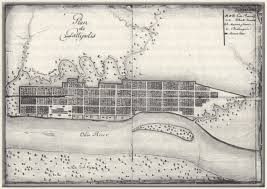|
In 1788 Brissot travelled to America in order to investigate the possibility of removing his family there, and also in order to try and make himself known: Brissot did not wish to give up his literary career, and if he were to move to a large unknown country, he would need the support of influential people. In that sense, his trip was not successful – he did not feel he had made enough of an impact to risk moving his name and career to the other side of the ocean. But the dream remained. When he wrote up his travel notes, which were published in 1792, he emphasized what he saw as the parts of American life worth reproducing: the Americans, he thought, lived well because their lives were simple and virtuous, and everything in it arranged according to reason. This was the dream he was after, and with which he infected his friends, the Rolands, Lanthenas, and Bancal. In a sense, it may have seemed safer to stay than to go. Those who moved to America, taking advantage of the dubious Scioto company, selling worthless land in Ohio, tended to be those who had either tried to make a life for themselves in France and failed, or those who had little hope of succeeding where they were. FelicitéBrissot, writing to her brother in Philadelphia, warns him of the possible arrival of several men they know, and of their various moral failings – one is selfish, another stupid, and a third so bad tempered that he has alienated everyone who could help him. She adds, charitably, that they are young and that therefore they may benefit from the move, but worries nonetheless about the effect of these men on the American communities (in particular the one she thinks of as intellectually limited, because he would, she thinks, encourage gossip). For those who care about the future of France, and who think that they are in a position to benefit the nation through their character, ambition, knowledge, then it is best that they stay and attempt to bring the American model to the new Republic, rather than draining it of its most promising elements in order to join those it has already rejected. Towards the end of 1789, land and building that had belonged to the church were put for sale to private buyers, as a way of reducing the national debt. This was an opportunity for Brissot to put his plans for a colony into practice without leaving the country. There were several reasons why that may have seemed like a good plan to him. First, his trip to America had not been the personal success he had hoped it would be, so that if he moved there, he would not be known as a writer, and could not count on the help he would surely need to establish himself in that profession. Secondly, France was now a desirable place to be for the reason America was: it was on its way to becoming a Republic, a land of freedom. Brissot first approached his friends Bosc and Lanthenas. The latter had some money and was enthusiastic about the idea – although he might have preferred the original plan of going to America. Bosc and Lanthenas suggested he include the Rolands in the plan. Manon Roland became the prime mover behind the plan, which, unfortunately, was never realized.
0 Comments
Leave a Reply. |
About
This is where I live blog about my new book project, an intellectual biography of three French Revolutionary women philosophers. Categories
All
Archives
November 2022
|

 RSS Feed
RSS Feed